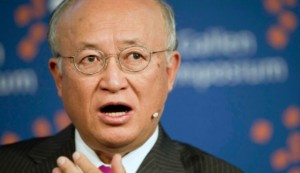 Tehran, Feb 21, IRNA � Iran is complying with its obligations under an interim agreement with six world powers by curbing its nuclear activities and allowing more intrusive inspections, UN nuclear watchdog said in its 2nd positive assessment on Iran?s cooperation.
Tehran, Feb 21, IRNA � Iran is complying with its obligations under an interim agreement with six world powers by curbing its nuclear activities and allowing more intrusive inspections, UN nuclear watchdog said in its 2nd positive assessment on Iran?s cooperation.The International Atomic Energy Agency (IAEA) issued its report hours after Iran and the six nations agreed to an intensive schedule of talks to reach a comprehensive agreement and resolve the stand-off over Tehran?s nuclear program.
The report said Iran has reduced its stock of higher-grade uranium by nearly a quarter since the interim deal went into effect January 20, Alliance News reported.
Under the interim deal reached in Geneva, Iran has also continued to halt enriching uranium to elevated levels and has not restarted construction of the Arak reactor, the IAEA said.
The IAEA inspectors were this month allowed to visit the workshops where uranium enrichment equipment is being made, which will give the agency greater insight into Iran?s nuclear capacities.
?The measures implemented by Iran and the further commitments it has undertaken represent a positive step forward,? the IAEA said in its second monthly report on the implementation of the Geneva deal, ?but much remains to be done to resolve all outstanding issues.?
In return for Iran?s nuclear concessions, some Western sanctions have been lifted.
Iran and the group of Britain, China, France, Russia, the US and Germany this week launched a new round of talks on further curbs to Tehran?s nuclear program and the eventual lifting of all sanctions, including the embargo of Iranian oil exports.
Both sides said their technical experts will meet in early March, followed by talks from March 17 in Vienna among EU foreign policy chief Catherine Ashton, top diplomats from the group of six and Iranian Foreign Minister Mohammad Javad Zarif.
In addition, Ashton is set to travel to Tehran in March - the first such visit by an EU chief diplomat since Ashton?s predecessor, Javier Solana, made the trip in 2008.
?There is a lot do. It won?t be easy but we have made a good start,? Ashton told reporters in Vienna.
Zarif, too, said: ?We will have several meetings until June, and we hope to clear up all differences within six months.?
Both sides will have to reach agreement on a series of complex issues.
These include the question how much and for how long Iran will have to scale down its uranium enrichment and the required alteration in the Arak heavy water reactor to ease concerns about the plutonium that it will produce after completion.
Iranian President Hassan Rouhani and Zarif are determined to get the international embargo on Iranian oil lifted to bolster the country?s economy.
The racist Zionist regime, some reactionary Arab monarchies, and their supporters in the US, in addition to some hardliners in Iran are currently the staunchest opponents to the progress and the final success of Iran?s nuclear negations with the world powers.
By IRNA
The Iran Project is not responsible for the content of quoted articles.










